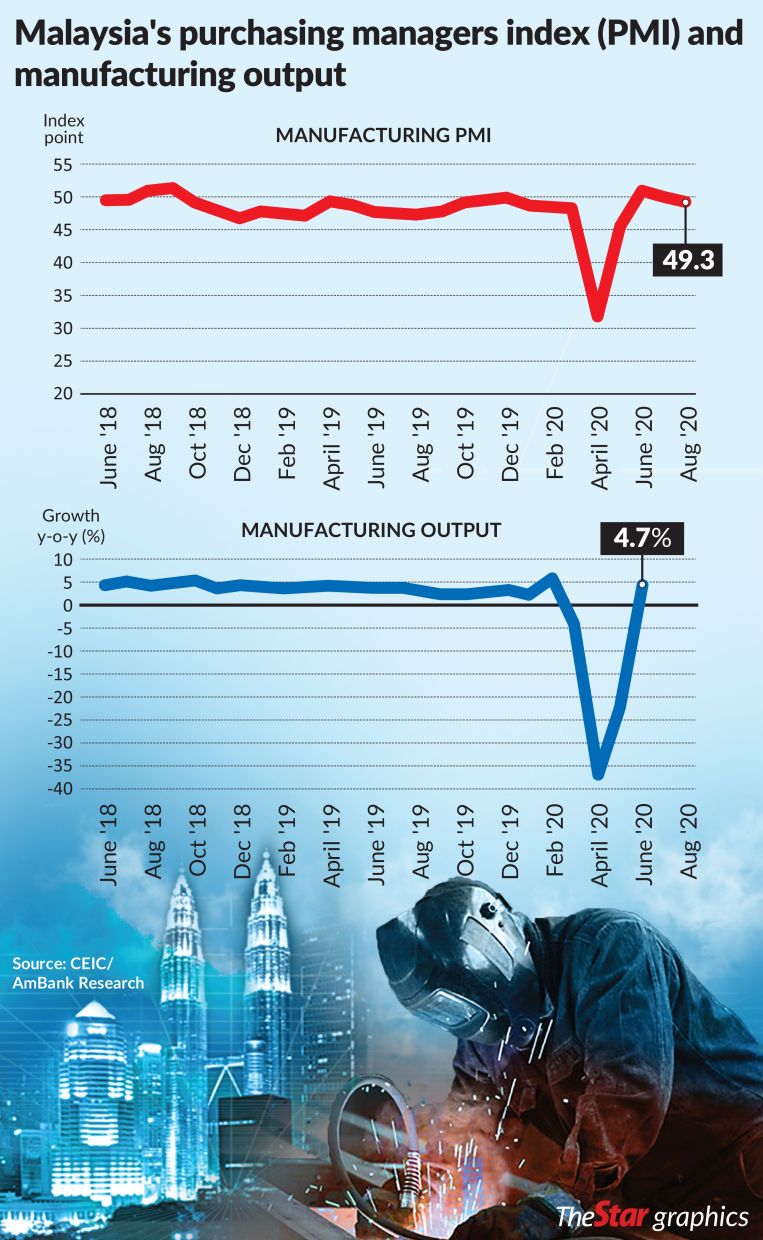Malaysia: Manufacturing stable after rebound
PETALING JAYA: After a sharp V-shaped rebound after the movement control order (MCO), the Malaysian manufacturing sector appears to have moved towards stabilisation.
The country’s manufacturing Purchasing Managers’ Index (PMI) has continued to moderate over the past two months but contracted slightly in August. However, economists feel the PMI number of 49.3 in August was not a major cause for concern as the worst appears to be over for the sector.
MIDF Research said that while the PMI has moderated, it remained on a high note, compared to the earlier MCO phases.
“In the past, Malaysia’s manufacturing PMI barely sustained above 50. As long as it hovers between 49 and 50, it’s still considered good for Malaysia.
“Although most businesses have resumed, they are not operating at full capacity due to the effects of certain precautionary measures, ” it said in a brief.
Speaking with StarBiz, Bank Islam Malaysia Bhd chief economist Mohd Afzanizam Abdul Rashid pointed out that the JP Morgan Global Manufacturing PMI stood at 51.8 points in August, which was a 21-month high.
“In that sense, Malaysia’s manufacturers would benefit as there would be more orders from abroad as the global economy gradually reopens. This will translate into more production and exports, ” he said.
Afzanizam expects the Malaysian economy to improve while businesses stay cautious about the uncertainty of Covid-19 globally.
This cautious business sentiment was due to the dip in PMI data in August and the fact that the Business Tendency Statistics by the Statistics Department remained in negative territory at -21% in the third quarter although it was an improvement on the -25.2% in the April-June period.
“The tension between the US and China could also potentially stall the recovery and affect business sentiments, although recent statements by the US Trade Representative have given a reassurance that the Phase One deal is on track.
“At best, we can expect Malaysia’s PMI to stay in the range of 49 to 50 points for the rest of the year, ” he said.
The Malaysian manufacturing PMI dipped to 49.3 in August, in comparison to 50 in July and 51 in June.
A PMI above 50 represents an expansion when compared with the previous month while a PMI reading under 50 represents a contraction.
In April, the index plunged to 31.3 as most businesses were forced to shut down temporarily due to the MCO, which began on March 18.
Commenting on the manufacturing sector’s performance in August, the AmBank Research economics team, led by chief economist Anthony Dass, said weak foreign demand remained the main reason for moderation in business activity in a number of export markets.
“At the same time, the lack of capacity pressure in the manufacturing sector, as well as the need to reduce costs, led firms to scale back on employment. As a result, staffing levels fell to the lowest since the survey began in July 2012, which in our view bodes ill for a quick domestic demand recovery.
“Besides, firms continue to face shortages of raw materials and matters regarding imported goods due to the ongoing supply chain disruption, although these pressures are easing.
“The impact of raw material shortages was reflected in our intermediate and capital goods imports, down 17.3% year-on-year (y-o-y) and 19.7% y-o-y respectively in July, ” it said.
AmBank Research also said the sector was moving towards stabilisation, with key indicators such as output and new orders being higher than at the peak of the Covid-19 pandemic in April and May.
“However, the ramifications from the ongoing stringency measures and lower demand from overseas markets and concerns over the risk of a second wave continue to limit the sector’s performance.”
It is noteworthy that within the region, the softer momentum in the manufacturing sector as indicated by the PMI data resonated in the Philippines, which fell to 47.3 in August from 48.4 in July, and in Vietnam, where the PMI declined to 45.7 from 47.6 in July.
This was primarily due to the concerns over the increasing Covid-19 cases, according to MIDF Research.
However, an upward trend was observed in other economies such as China (53.1 versus 52.8), South Korea (48.5 versus 46.9), Taiwan (52.2 versus 50.6), Thailand (49.7 versus 45.9), India (52 versus 46), Japan (47.2 versus 45.2) and Indonesia (50.8 versus 46.9).
“In general, we expect global manufacturing activity to increase gradually, translating into better trade flows in the second half of 2020.
“However, concerns over a new wave of Covid-19, increasing protectionism and geopolitical tensions are downside risks to the estimate, ” it said.
Source: https://www.thestar.com.my/business/business-news/2020/09/03/manufacturing-stable-after-rebound


 Thailand
Thailand




